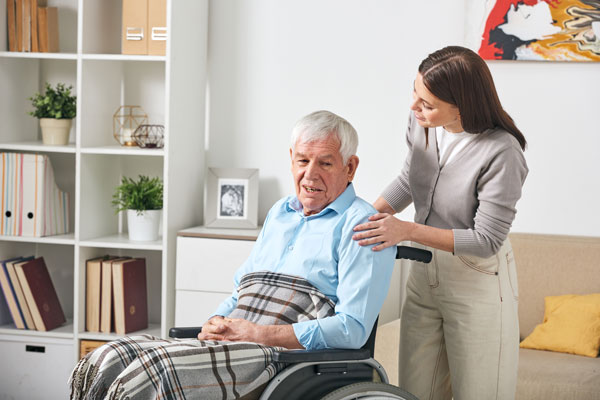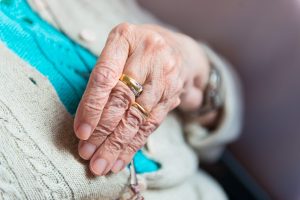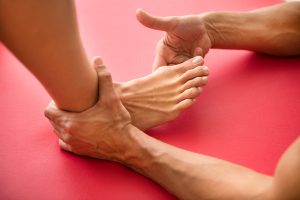Dementia & strange behavior



My mom is in late stage dementia. Most of the time she’s sweet and calm but sometimes she does such weird things like trying to rip the button off her sweater because she wanted to put it in her ice cream; putting cookies in her water glass; trying to take a bite out of an ant trap; thinking the cat is a dog; pouring water all over her dinner. She wears adult diapers and is sometimes incontinent but does get up and get herself to the bathroom at other times, then maybe an hour later will insist she CAN’T get up and needs help. It’s definitely a roller coaster ride. I’d like to hear about others experiences.
Comments
-
We had lots of those weird things! Mom bit on some odd items and would sometimes clamp down on them and it was difficult to remove them. I actually got her baby teethers, which were kinda gross cause she drooled but yeh. She would pour her water in her food also. Spit things out in her water. I had to be careful of small items as choking hazards. My mom was also kind and compliant for the most part.
Moms fear of getting up eventually rendered her bed ridden. It was a hard reality to adjust to. Hate this disease. So sorry!
0 -
Thanks for your reply (m&m). Is your mom still with you?
0 -
New to the group - I was talking with a coworker recently whose Mother had Alz and would occasionally do things out of character. He found that during these times she was usually suffering with a UTI so they’d put her on antibiotics to clear things up. The out of character behavior would stop. Some thing to consider if you haven’t already done so.1
-
So true MColarossi, UTIs can definitely be silent, meaning no symptoms, and reek havoc. Always a good thing to check out thoroughly. UTI was not a culprit in my moms weirdness but you never know. Welcome to this forum but wish you didn’t find yourself here.
aeliasz, my mother passed 12/20/22. We moved her here so I could care for her in June 2020. Unfortunately after 2.5 years, covid ended up taking her, I got ill with it first 😞. Both covid and Alzheimer’s were listed on her death certificate. She was declining and was stage 7e “they” said, yet I wasn’t ready and didn’t think she was either but apparently, she was. Blessing in disguise some would say, still difficult.
2 -
M & M, so very sorry for your loss, and thank you for still being here to offer help and guidance for those of us still in the “trenches”. Your comments are always insightful, compassionate and appreciated. As much as I hate this disease that binds us all here, I have days I feel blessed my mom is still with me and days I pray for peace for her and her family. Either way the pain is unbearable.
1 -
M&M I am so sorry for your loss
0 -
M&M, my condolences on the loss of your mother. I appreciate that you’re still on this site to offer advice!
It seems my mom has some of the same behaviors that yours did. Yesterday I went outside to do some yard work. She seemed pretty “with it “so I of course told her first, (stupidly thinking that she would be ok and remember) I came in about a half hour later and she was in a panic because she didn’t know where I was. She was so worked up and crying. It was awful. This is the second time this has happened so I messed up by thinking she would be ok. She’s never going to be ok again. I’m going to have to figure out how to do things differently, learning as I go.
0 -
Thanks for your sympathies. I couldn’t have gotten as far as I have without the wise and supportive warriors here.
It took me a couple of caregiver fails, too many times, to realize I had to approach mom differently for some things. Early on, if I went outside or whatever while she napped in her chair, I’d leave an easel with a note that I’d be right back. Only worked a couple of times. I understand…we understand…you’re not alone.
I wish you didn’t have to be in these trenches also. Just a horrible place we find ourselves. 💕
0 -
I think what you're experiencing is what's called "shadowing." When a person with dementia's special person disappears they panic because they only feel safe when they are near that person. When I started caring for my mom three years ago this totally baffled me. And frustrated me. I'd go outside to do a little gardening or walk the dog and when I got back inside the house my mom would be in total freak-out mode, tearful, sometimes screaming, threatening to call the police. Where had I gone? Why had I abandoned her? I think my mom was in Stage 4 or 5 of Alzheimer's when the shadowing started. I found it frustrating because my mom had to be tethered to me or else she would melt down with anxiety. The problem was especially acute when she was sundowning, in the later part of the afternoon and evening. I pursued getting anti-anxiety medication for her from her primary-care physician and a geriatric clinic, but my entreaties seemed to fall on deaf ears. Eventually the shadowing stopped when she progressed to later stages of dementia. And the nurse at the memory care where I moved her was able to work with her physician to get her on a mix of anti-anxiety meds that calmed her.
0 -
Yesterday when I visited my mom she was sucking on a finger. I asked what she was doing and she said she was "trying to get the water out." Then she said "It doesn't seem to be working." Did she think her finger was a straw? I asked if she wanted a glass of water and she said no. I got her one anyway and she drank from it.
0 -
I’ve seen stage “ 7e “ mentioned a few times here on this site. I thought stage 7 was just late stage AD and had no categories. What exactly is the “e” ?
0 -
At what stage would you say they lose the ability to read and write and tell time? My mom lost these things over a year ago. She’s 85 and was diagnosed in 2018 but the disease most likely started about 7 years ago.
0 -
within these paragraphs are some descriptions of sub categories of stage 7. There’s 7a-f. The hospice nurse had a quick look up for them but I couldn’t find a better list quickly for you. I’m going to keep looking. I don’t think each decline is definitive for all, and could take less or more time than the author describes, as many would probably agree. My mom could still smile/laugh (such a blessing for me) and she’d talk a lot to someone/thing but it didn’t make much sense. Some abilities might be in one stage while the others are in another, just my opinion. I think mom stopped reading, writing and telling time in mid stage 6. Here’s the link to this particular article with all the stages. https://www.alzinfo.org/understand-alzheimers/clinical-stages-of-alzheimers/
Hope this helps.
STAGE 7: VERY SEVERE COGNITIVE DECLINE
SEVERE DEMENTIA
At this stage, AD persons require continuous assistance with basic activities of daily life for survival. Six consecutive functional substages can be identified over the course of this final seventh stage. Early in this stage, speech has become so circumscribed, as to be limited to approximately a half-dozen intelligible words or fewer (stage 7a). As this stage progresses, speech becomes even more limited to, at most, a single intelligible word (stage 7b). Once intelligible speech is lost, the ability to ambulate independently (without assistance), is invariably lost. However, ambulatory ability may be compromised at the end of the sixth stage and in the early portion of the seventh stage by concomitant physical disability, poor care, medication side-effects or other factors. Conversely, superb care provided in the early seventh stage, and particularly in stage 7b, can postpone the onset of loss of ambulation. However, under ordinary circumstances, stage 7a has a mean duration of approximately 1 year, and stage 7b has a mean duration of approximately 1.5 years.
In persons with AD who remain alive, stage 7c lasts approximately 1 year, after which persons with AD lose the ability not only to ambulate independently but also to sit up independently (stage 7d), At this point in the evolution, the person will fall over when seated unless there are armrests to assist in sitting up in the chair.
This 7d substage lasts approximately 1 year. AD persons who survive subsequently lose the ability to smile (stage 7e). At this substage only grimacing facial movements are observed in place of smiles. This 7e substage lasts a mean of approximately 1.5 years. It is followed in survivors by a final 7f substage, in which AD persons additionally lose the ability to hold up their head independently.
Persons can survive in this final 7f substage indefinitely; however, most persons with AD succumb at various points during the course of stage 7 to pneumonia, infected ulcerations, or other conditions.
With the advent of the seventh stage of AD, certain physical and neurological changes become increasingly evident. One of these changes is physical rigidity. Evident rigidity upon examination of the passive range of motion of major joints, such as the elbow, is present in the great majority of persons with AD throughout the course of the seventh stage.
In many persons with AD, this rigidity appears to be a precursor to the appearance of overt physical deformities in the form of contractures. Contractures are irreversible deformities which prevent the passive or active range of motion of joints. In the early seventh stage (7a and 7b), approximately 40% of AD persons manifest these deformities. Later in the seventh stage, in immobile persons with AD (from stage 7d to 7f), nearly all AD persons manifest contractures in multiple extremities and joints.
Neurological reflex changes also become evident in stage 7 AD persons. Particularly notable is the emergence of so-called ‘infantile’, ‘primitive’ or ‘developmental’ reflexes which are present in the infant but which disappear in the toddler. These reflexes, including the grasp reflex, the sucking reflex, and the Babinski plantar extensor reflex, are increasingly present as the stage 7 AD person’s condition advances. Because of the greater physical size and strength of the AD person in comparison to an infant, these reflexes can be very strong and can impact both positively and negatively on the care provided to the person with AD. AD persons commonly die during the course of the seventh stage. The mean point of demise is when persons with AD lose the ability to ambulate and to sit up independently (stages 7c and 7d).
The most frequent proximate cause of death in persons with Alzheimer’s is pneumonia. Aspiration is one common cause of terminal pneumonia. Another common cause of demise in AD is infected decubital ulcerations. AD persons in the seventh stage are also vulnerable to all of the common causes of mortality in the elderly including stroke, heart disease, and cancer. Some AD persons in this final stage appear to succumb to no identifiable condition other than AD.
0 -
https://www.healthline.com/health/stages-progression-alzheimers#stage-6
here’s a quick one and the link to the full article is above.
Severe Alzheimer’s
There are substages to this final stage, which lasts about 1 1/2 to 2 1/2 years.
7a: Speech is limited to six words or fewer. A doctor will need to repeat questions during the interview.
7b: Speech declines to only one recognizable word.
7c: Speech is lost.
7d: They’ll be unable to sit up independently.
7e: Grim facial movements replace smiles.
7f: They’ll no longer be able to hold their head up.
Body movements will become more rigid and cause severe pain. According to the Alzheimer’s Association, about 40 percent of people with Alzheimer’s also form contractures, or shortening and hardening of muscles, tendons, and other tissues. They’ll also develop reflexes characteristic of infancy, such as sucking.
Caregiver support: At this stage, the person’s ability to respond to the environment is lost. They’ll need help with almost all their daily tasks, including eating or moving. Some people will become immobile during this stage. The most frequent cause of death in someone with stage 7 Alzheimer’s is pneumonia.
0
Commonly Used Abbreviations
DH = Dear Husband
DW= Dear Wife, Darling Wife
LO = Loved One
ES = Early Stage
EO = Early Onset
FTD = Frontotemporal Dementia
VD = Vascular Dementia
MC = Memory Care
AL = Assisted Living
POA = Power of Attorney
Read more
Categories
- All Categories
- 604 Living With Alzheimer's or Dementia
- 325 I Am Living With Alzheimer's or Other Dementia
- 279 I Am Living With Younger Onset Alzheimer's
- 17.1K Supporting Someone Living with Dementia
- 5.6K I Am a Caregiver (General Topics)
- 8.3K Caring For a Spouse or Partner
- 2.8K Caring for a Parent
- 227 Caring Long Distance
- 164 Supporting Those Who Have Lost Someone
- 17 Discusiones en Español
- 5 Vivir con Alzheimer u Otra Demencia
- 4 Vivo con Alzheimer u Otra Demencia
- 1 Vivo con Alzheimer de Inicio Más Joven
- 12 Prestación de Cuidado
- 3 Soy Cuidador (Temas Generales)
- 8 Cuidar de un Padre
- 23 ALZConnected Resources
- View Discussions For People Living with Dementia
- View Discussions for Caregivers
- Discusiones en Español
- Browse All Discussions
- Dementia Resources
- 8 Account Assistance
- 15 Help












